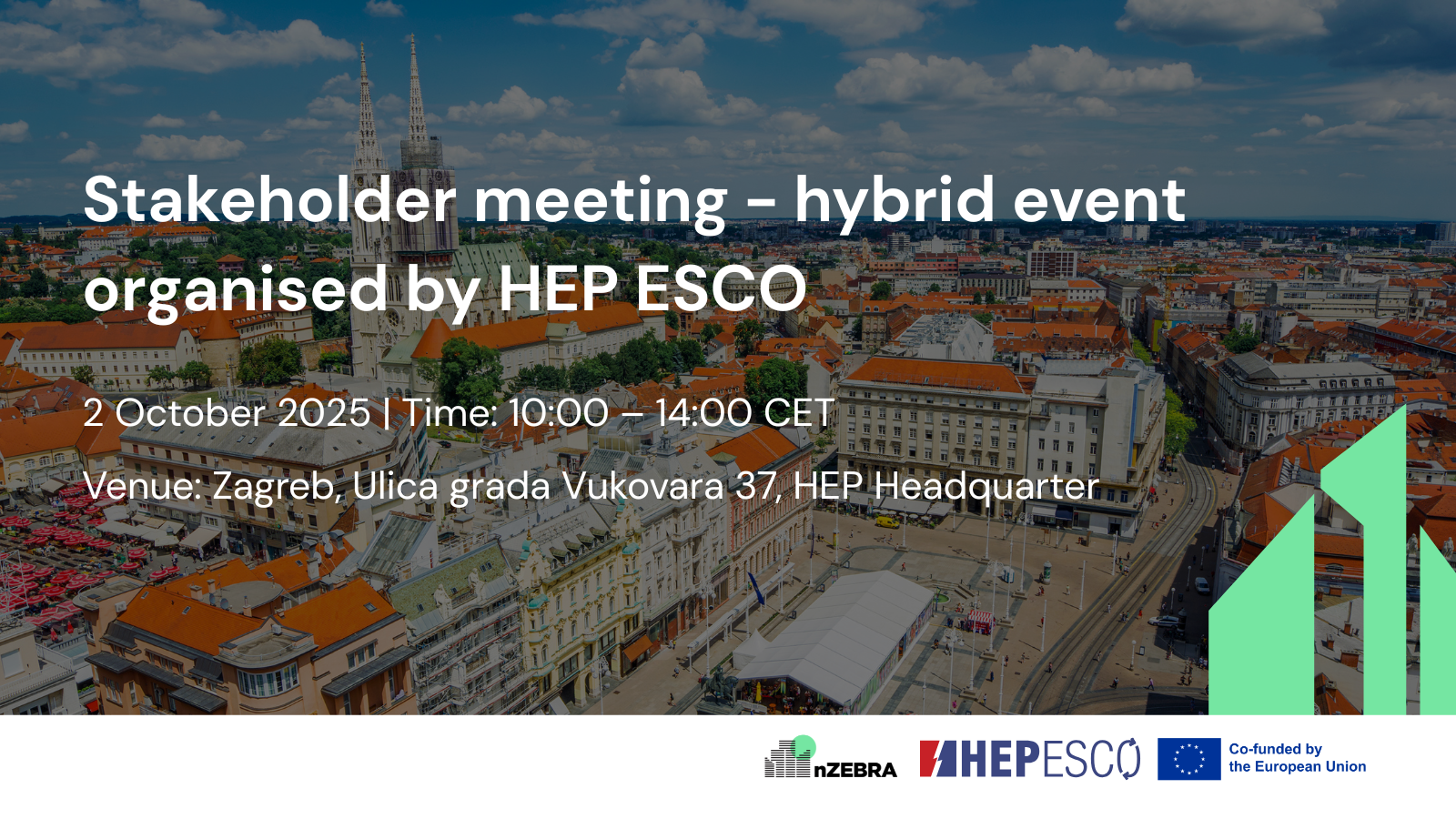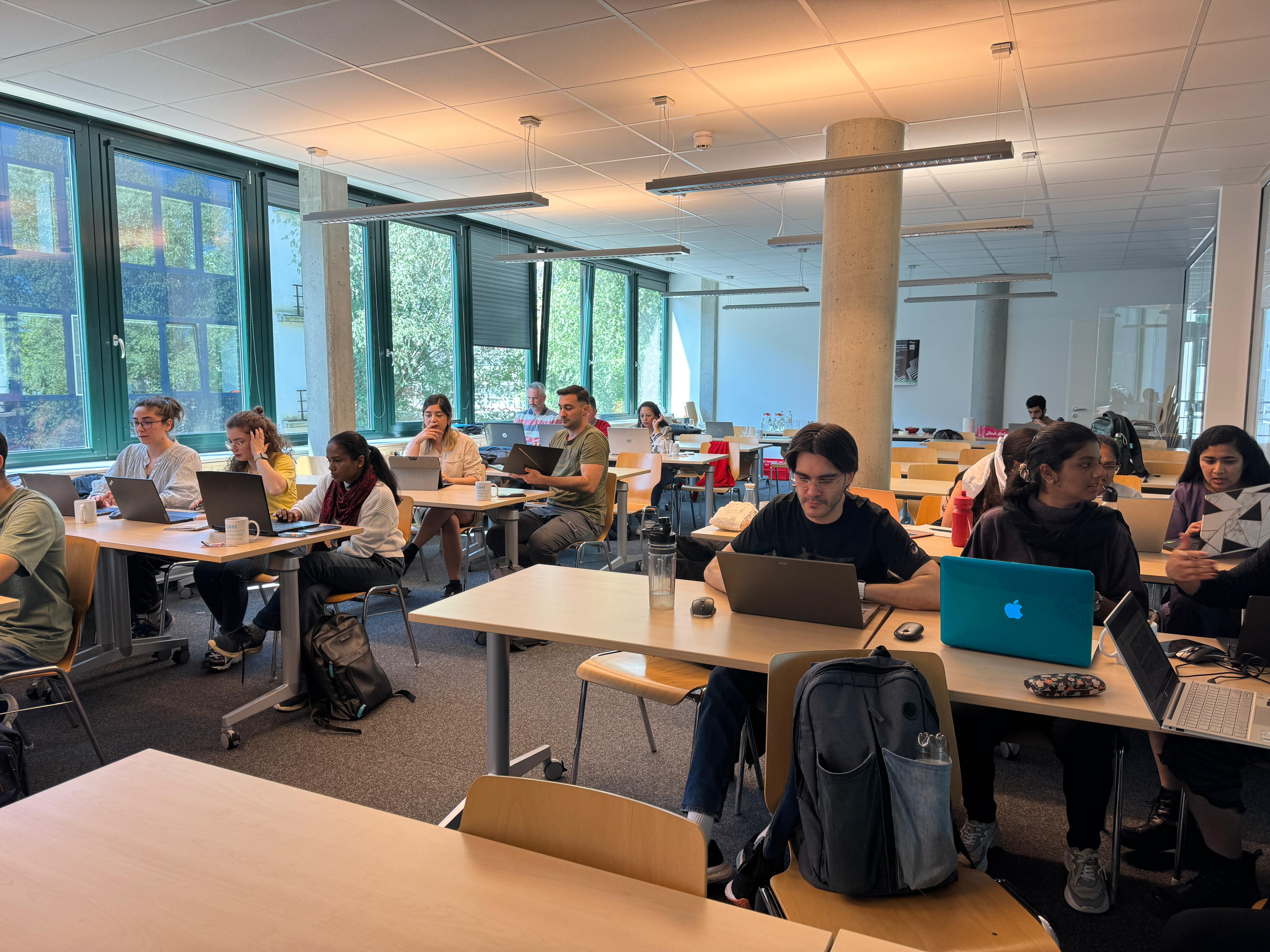News & Events
.jpg)
February 13, 2026
nZEBRA Final stakeholder meeting: Registraion is open
We are pleased to welcome participants to the final nZEBRA stakeholder hybrid meeting, marking an important milestone as the project reaches its conclusion.
%20(1).jpg)
January 26, 2026
nZEBRA Final Summer School: Turning knowledge into practice
The nZEBRA Final Summer School, hosted by Halmstad University, marks a major milestone for the project and will formally conclude its activities.

October 6, 2025
HEP ESCO Hosts Stakeholder Meeting for the nZEBRA Project in Zagreb
The nZEBRA project took another step forward in advancing sustainable construction across Europe with the successful organisation of a stakeholder meeting held on 2 October 2025 at the headquarters of HEP in Zagreb.

August 28, 2025
Press Release: Stakeholders meeting in Zagreb under the framework of the nZEBRA project
HEP ESCO will host a hybrid stakeholder meeting in Zagreb on 2 October 2025 as part of the EU-funded nZEBRA project – Sustainable Future of Buildings.

July 30, 2025
Reflections from the nZEBRA Summer School in Hamburg
The nZEBRA Summer School, held in Hamburg brought together master's students from across Europe for an intensive learning experience focused on climate-neutral buildings and advanced simulation tools.

March 31, 2025
Sustainability Starts Here: The Power of Educating in Green Construction
Sustainability has become an essential pillar of the modern construction sector. Future construction professionals must be equipped with the skills and knowledge to rethink traditional practices. Educational initiatives such as workshops, summer schools, and university-led challenges play a vital role in fostering this shift.
.jpg)
February 25, 2025
nZEBRA General Assembly in Hamburg: Key Takeaways and Exciting Plans Ahead!
A few weeks ago, the nZEBRA partners gathered in Hamburg for a dynamic and productive General Assembly (GA), hosted by the Hamburg University of Technology (TUHH).The meeting was a great opportunity to reflect on our progress, set new milestones, and fine-tune the project’s next steps.

January 27, 2025
Dive into nZEB and ZEB Concepts at the nZEBRA Summer School 2025
The nZEBRA team is thrilled to announce the launch of our first-ever nZEBRA Summer School, set to take place from June 9th to 13th!
%20(Landscape)).jpg)
October 30, 2024
Youth Leading Climate Action for Sustainable Cities
This year’s World Cities Day focuses on the theme “Youth Leading Climate and Local Action for Cities.” Young people are stepping up, advocating for bolder actions to tackle the climate crisis in our urban environments. Their voices and actions are crucial in shaping a sustainable future. Upskilling students and professionals in new practices (ZEB and nZEB), content, and tools is essential to achieving these ambitious goals.

July 30, 2024
Enhancing Energy Management Skills
On July 4-5, 2024, HEP-ESCO conducted an "Energy Managers Course" for 15 participants from five major energy companies. The course focused on enhancing expertise in energy management and efficiency, covering EU energy reduction goals, Croatian legislation, and the "energy efficiency first" principle. Participants learned about the ESCO Monitor system, performance measurement protocols, and maintenance efficiency standards. Sandra Maganje also introduced the nZEBRA project and its future intensive course.

July 19, 2024
Different EU approach to nZEB in the EU Member States
The concept of nearly Zero-Energy Building (nZEB) was introduced in the EPBD recast in 2010 (EPBD/2010/31/EU). Article 2 of the recast directive establishes what a nZEB is: a building with “a very high energy performance with the nearly zero or very low amount of energy required covered to a very significant extent by energy from renewable sources, including energy from renewable sources produced on-site or nearby”.

May 24, 2024
Energy and sustainability: Why is energy efficiency important and what is the link to sustainability?
To achieve sustainability in the built environment through energy efficiency, we must decarbonise the building sector by using low-carbon materials and ensuring proper insulation. Additionally, we need flexible energy systems for heating and hot water that can adapt to various energy sources, such as district heating from renewables and industrial excess heat, along with energy-efficient appliances and lighting to create nearly zero-energy buildings.

May 17, 2024
Resilience Pathways for Climate Extremes: Key to Urban Energy Transition and Climate Change Adaptation
Cities, responsible for over 75% of global energy consumption, face challenges from urbanization, climate change, and extreme weather. To adapt, urban energy systems require resilience and smart, integrated solutions.

April 30, 2024
A Greener Horizon: The Strengthened Energy Performance of Buildings Directive
Earlier this month, the European Commission marked a major step toward sustainability with the adoption of the updated Energy Performance of Buildings Directive, a key part of the European Green Deal.

February 22, 2024
The co-created nZEBRA course at Halmstad University
We want to co-create a multidisciplinary course on Master level, with mixed groups of students from several engineering and architecture programmes as well as professionals from companies.

February 23, 2024
Empowering Future Professionals with nZEB skills
In September, the nZEBRA project kicked off in Halmstad, Sweden, with a pivotal two-day meeting organized by Halmstad University. The project aims to develop an intensive blended course focusing on Climate Neutral Buildings using micro-credentials.



